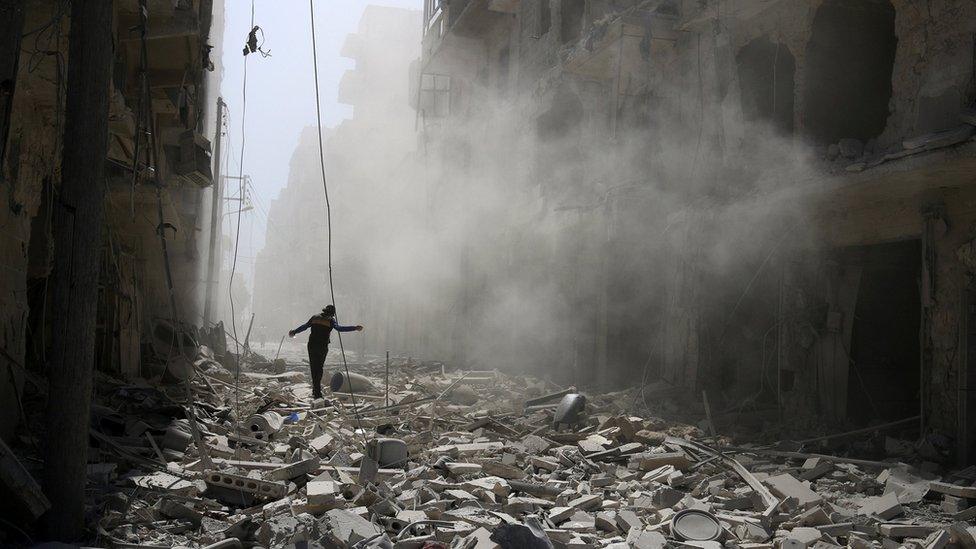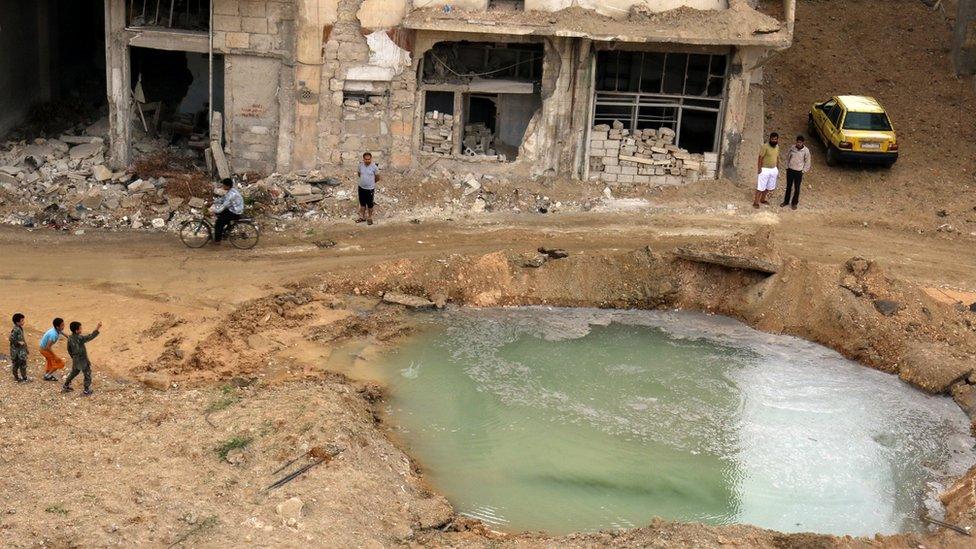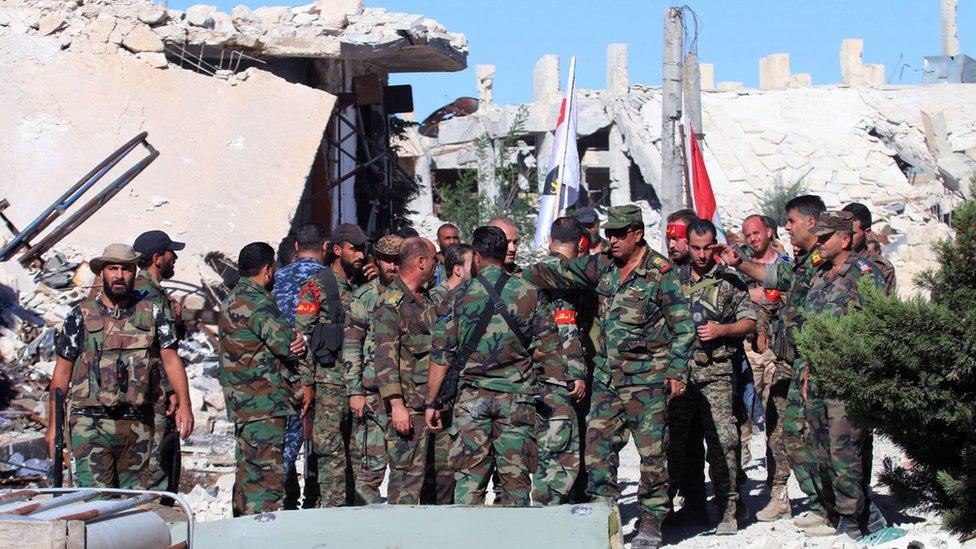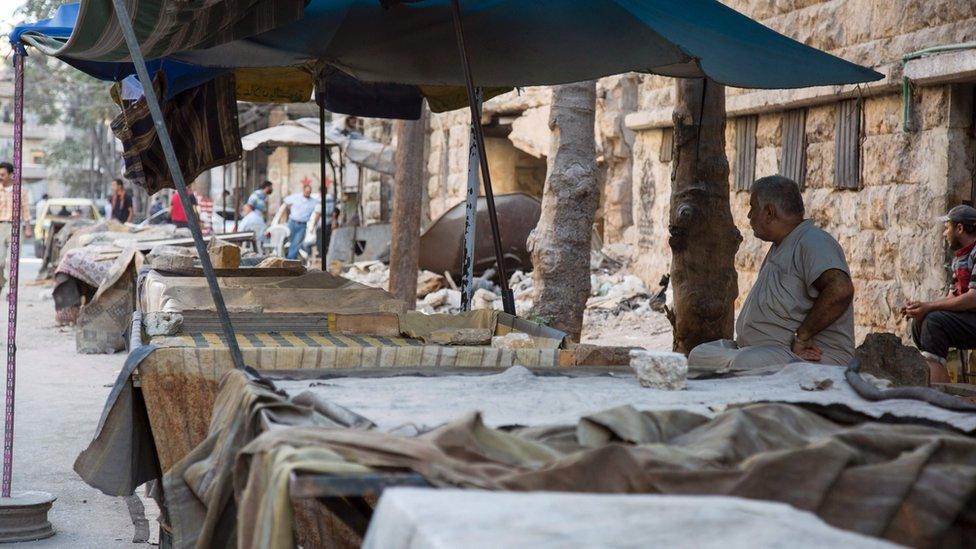Syria conflict: US and UK rhetoric 'unacceptable' - Russia
- Published

A monitoring group has documented 162 deaths in rebel-held Aleppo in the past week
Russia has criticised the US and UK for using "unacceptable" tone and rhetoric in speeches on Syria at the UN, after being accused of "barbarism".
On Sunday, US permanent representative Samantha Power said Russian and Syrian forces were "laying waste" to besieged rebel-held areas of the city of Aleppo.
Kremlin spokesman Dmitry Peskov warned that such language might damage efforts to end the five-year civil war.
Activists meanwhile reported dozens of fresh air strikes on Aleppo overnight.
The Syrian Observatory for Human Rights, a UK-based monitoring group, said at least two civilians had been killed and many wounded.
At least 162 people are believed to have died in rebel-held Aleppo since last Monday, when a truce brokered by the US and Russia collapsed.
The US, UK and France, which back the opposition to Syrian President Bashar al-Assad, openly accused Russia of lying about its involvement in the assault on Aleppo at an emergency session of the UN Security Council.

Activists said they believed a bunker-busting bomb hit Aleppo's Tariq al-Bab district on Friday
British permanent representative Matthew Rycroft said, external Mr Assad's forces and Moscow had "plunged to new depths and unleashed a new hell on Aleppo", which was once Syria's largest city and the country's industrial and commercial hub.
He alleged that they were committing war crimes by using bunker-busting bombs to destroy underground shelters, dropping incendiary weapons indiscriminately on civilian areas, and targeting the city's water supplies.
The US ambassador to the UN accused Russia of "barbarism"
Ms Power told, external the meeting: "Instead of pursuing peace, Russia and Assad make war. Instead of helping get life-saving aid to civilians, Russia and Assad are bombing the humanitarian convoys, hospitals, and first responders who are trying desperately to keep people alive."
"What Russia is sponsoring and doing is not counterterrorism; it is barbarism," she added.

BBC Monitoring: Russian media hail defiant diplomats
Pro-Kremlin media in Russia have been gripped by the discussions on Syria at the UN Security Council, but they offered little comment on the accusations levelled against Moscow.

Troops captured the Palestinian refugee camp of Handarat, north of Aleppo, on Saturday
Instead, they dismissed the charges as "groundless" and hailed the response of Russian envoy Vitaly Churkin. "Both US and UK permanent representatives were lavish in criticising Moscow and Damascus, but received a firm response," said Gazprom-owned NTV.
State-owned newspaper Rossiyskaya Gazeta accused the US and its allies of trying to "exert pressure on Damascus and Moscow, while doing nothing to meet their own obligations".

Russian ambassador Vitaly Churkin blamed, external the unravelling of the truce deal on the US, saying it had failed to convince mainstream rebels to distance themselves from "terrorist" groups, especially the al-Qaeda-linked Jabhat Fatah al-Sham.
Mr Peskov also rejected the Western criticism at a news conference on Monday.
Aleppo: Key battleground in Syria's civil war
"We note that the tone and rhetoric used by official representatives from the UK and US is generally unacceptable and it can seriously damage the settlement process and our bilateral relations," he said.
Mr Peskov acknowledged that the truce deal had been "not very effective", but insisted that Moscow "definitely remains hopeful".
He also warned that "terrorists" had used the truce to "regroup, replenish their arsenals and obviously prepare for offensive actions".

Food is becoming increasingly hard to find in Aleppo, three weeks into the government's siege
Meanwhile, a medical source in rebel-held Aleppo told the AFP news agency that a shortage of blood meant hospitals were struggling to deal with the huge number of casualties caused by air strikes over the past four days.
There was also no water supply in many areas after pumping stations were damaged at the weekend, and several charity kitchens were forced to close because of the violence.
